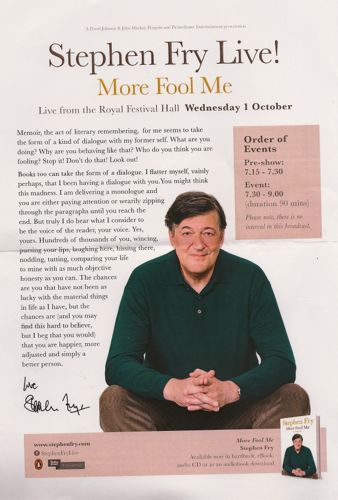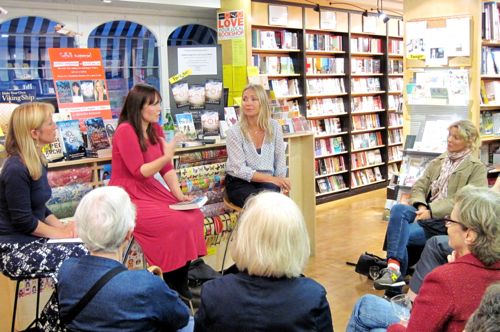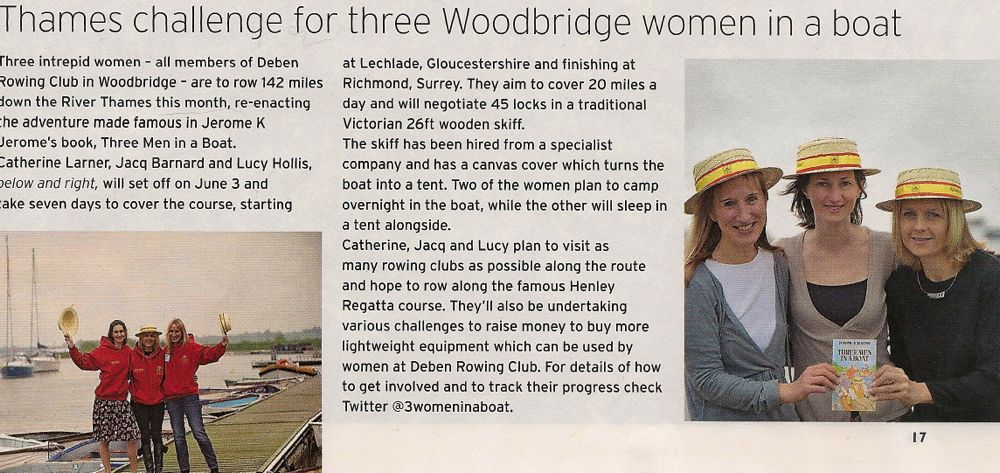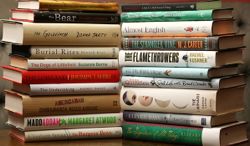News
Receive my weekly message direct in your inbox each Sunday evening, by registering here.
My recent newsletters are also available from here.
 Stephen Fry has a lot of quite interesting things to say. He is a man of great talent, experience and knowledge, who likes pushing boundaries. So I was intrigued to find out how he would carry off a book publicity tour, without travelling out of London.
Stephen Fry has a lot of quite interesting things to say. He is a man of great talent, experience and knowledge, who likes pushing boundaries. So I was intrigued to find out how he would carry off a book publicity tour, without travelling out of London.
Some 300 cinemas in the UK and, I think, a dozen countries around the world had signed up for a live stream of his talk promoting his memoir 'More Fool Me' at the Royal Festival Hall this week.
The trailer had already sat badly with me. OK, he could claim he was being blatantly clear about the money-making opportunity of the event for him, and, perhaps his patronising manner is part of his charm for many. But it is rather insulting to be expected to pay £12.50 to sit in a cinema so that he can urge you to buy his £25 book.
Having run a large number of live author events now, I find that people often begrudge paying just £6 to hear their favourite author talk if the occasion is to promote a new book, particularly if it's a hardback. And yet this is when the audience has the opportunity to rub shoulders with the 'celebrity' in a modest gathering of people, hear a talk which has usually been prepared especially for them, ask questions, and then have their book, if they choose to buy it, personally signed. Fry offered none of this.
He stepped on stage looking dishevelled and ill at ease. He was sweating profusely and was breathy and stuttery. He opened by admitting that he hadn't got a script for the evening - is this really something to trumpet, particularly after Ed Milliband's disaster. I would have been pleased if he could show he'd invested some time and thought into the venture by carefully crafting an argument or series of anecdotes. As he proved by a reading from his book, he is able to deliver a script beautifully!
I won't go through the whole presentation, and it's easy to be critical, but with a man who has so much to say about technology, communication, modern times, knowledge, reading etc etc, why couldn't he have talked to us about something thought-provoking rather than this ramble? There were moments - it's obvious Oscar Wilde has had a profound effect on his life, for example. And his reading from the 'gossip' in his book was very entertaining, though rather self-indulgent: how lovely to have royalty come for tea brewed on the Aga, joining you and your celebrity friends for Christmas in your country cottage.
He probably lost me completely when he said how he refused to do print interviews (and probably how he argued against doing live appearances for his book promotion). Why should he meet some 'tit of a profile writer', he said. He has 7.5 million Twitter followers so reaches more people than all the broadsheet newspapers put together, he went on. But he is answerable to no one with Twitter, and perhaps he has become a victim of his own success; a 'tit' of a profile writer might have some valid comments to make and for a man who is so thoughtful and provocative, or so we have been led to believe, you would have thought he would have been willing to enter into a debate or analysis about his work and his views.
But, my point, and I'm a long time getting there(!) is that Stephen Fry is currently engaged in another venture in promoting his new book. It was reported in the trade magazine last week (and I have to confess that I read it twice and still didn't understand what they were asking people to do) that Penguin Random House and author Stephen Fry are launching a “global digital storytelling project where text and technology meet”, which will “ask questions about the nature of how we create and publish autobiography in the digital environment”.
Called YourFry, it will challenge people to reinterpret Fry’s new memoir in any language or form, including text, data visualisation, app, audio and 3D modelling. It is a way of reaching an audience which would not normally see or respond to regular marketing initiatives for a book like his. And that's what I would have liked to have heard him talk about...and his views on why we need memoirs, and what he gained from writing this book, and how he views his success and what having 7.5 million Twitter followers really means to him and to us.
By the way, I didn't have to pay £12.50 to hear him speak. I was at the cinema on behalf of the local independent bookshop, offering Fry's books for sale. The cinema was only a quarter full and I didn't sell a single copy of the book.
PS A week later and Stephen Fry's memoir 'More Fool Me' has topped the bestseller lists...

It was fascinating to hear how authors Saskia Sarginson and Louise Millar approached writing their latest books when they visited Browsers this week.
They have both set their psychological suspense novels in Suffolk: 'Without You' is based around Orford, and 'The Hidden Girl' in a village somewhere north of Woodbridge. "It's so easy to get lost here," Louise said.
 I seem to have taken over the latest issue of 'Suffolk Magazine' - my articles about Griff Rhys Jones, Felixstowe Book Festival and thriller writer, Colette McBeth all appear, but my adventure as Three Women in a Boat is also reported, and I was asked to present my highlights for the coming month in the introductory page.
I seem to have taken over the latest issue of 'Suffolk Magazine' - my articles about Griff Rhys Jones, Felixstowe Book Festival and thriller writer, Colette McBeth all appear, but my adventure as Three Women in a Boat is also reported, and I was asked to present my highlights for the coming month in the introductory page.
 Our row along the Thames, marking the 125th anniversary of the publication of the classic Jerome K. Jerome tale 'Three Men in a Boat' seems to have captured the imagination of many.
Our row along the Thames, marking the 125th anniversary of the publication of the classic Jerome K. Jerome tale 'Three Men in a Boat' seems to have captured the imagination of many.
Last week we were guests of honour at the unveiling of a blue plaque to the author at an unassuming terrace in Bloomsbury, London. We appeared in the Camden New Journal alongside the other guests - Griff Rhys Jones, Rory McGrath and Frank Dobson MP - and today we were speaking on BBC Radio Suffolk. Listen to our interview here.
It's lovely to get so much attention - if it helps our fundraising cause for Deben Rowing Club, and if we manage to complete the row: all eight days and 142 miles!
We are constantly being told that independent bookshops are a rarity, and indeed news of closures outstrips those of openings. However, there is still an astonishing creativity, professionalism and flair at work in this area and they are continuing to be beautiful, inspiring places to visit - proving as much a 'leisure attraction' as a resource or commodity.

 Recently on a visit to friends in the North East, I returned to the wonderful Barter Books, a secondhand bookshop in a disused railway station in Alnwick, and made a further journey across the border to the award-winning book and giftshop, deli and cafe that is Main Street Trading Company in St Boswell's.
Recently on a visit to friends in the North East, I returned to the wonderful Barter Books, a secondhand bookshop in a disused railway station in Alnwick, and made a further journey across the border to the award-winning book and giftshop, deli and cafe that is Main Street Trading Company in St Boswell's.
Both had a stunning attention to detail, decorating their spaces with more than the bookshelves. Both offered food and drink for sale, and places to sit and relax while browsing. Both made choosing a book a communal experience with displays, notices, advice. And both offered souvenirs of your visit! I couldn't resist, buying a beautiful ceramic monotone mug from each.
 I think all booklovers agree that there is nothing like the pleasure, the sense of anticipation, in touching, feeling, turning the pages of a book (while not denying the resource that is the e-book).
I think all booklovers agree that there is nothing like the pleasure, the sense of anticipation, in touching, feeling, turning the pages of a book (while not denying the resource that is the e-book).
Increasingly buying a book from a bookshop will be more than handing over cash and shoving the purchase in a plastic carrier. It will also be about selling a memory, a feeling, an experience.
 The longlist for the Baileys (no apostrophe!) Women's Prize for Fiction was announced last night and I'm more excited than I think I've ever been with a book prize! I've already read three of the titles, three more are on my must read list and I am familiar with almost all of them. So, full of anticipation and, if I get the time, to work my way through a few more of the books in order to make my own choice against that of the judges.
The longlist for the Baileys (no apostrophe!) Women's Prize for Fiction was announced last night and I'm more excited than I think I've ever been with a book prize! I've already read three of the titles, three more are on my must read list and I am familiar with almost all of them. So, full of anticipation and, if I get the time, to work my way through a few more of the books in order to make my own choice against that of the judges.